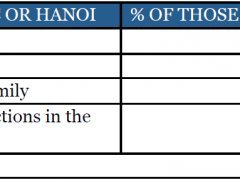I-Field: Borrowing and Migrating

This article was originally drafted by Indochina Research for the newsletter “I-Light” as part of the Rockefeller Foundation’s Searchlight Process. For more Searchlight content on futurechallenges.org, please click here.
To understand the views held among the urban poor in Vietnam on a variety of topics, we undertook a survey whose results are reported below. The topics included:
- Awareness of and attitudes towards borrowing money
- Reasons to migrate to city
- Perception of Working in the city/Independence/Future/Borrowing Money
- Experience with borrowing money/from where/for what
We surveyed 200 respondents based on the follow criteria:
- Monthly income of less than USD250 per month
- Those who work for themselves or would like to work for themselves/open their own business
- Split evenly between those who live in Hanoi and Ho Chi Minh City (HCMC)
- Aged from 25 and above
Summary
Personal Situation
55% of respondents work for themselves or their family and 45% work for someone else by choice.
50.5% of respondents have moved to either HCMC or Hanoi from somewhere else. This represents a migration shift to the largest urban areas in Vietnam. Those who moved to these main areas have done so primarily for financial considerations and opportunities. The reasons are as follows:
Interestingly, more respondents that moved to Hanoi did so for financial reasons (89.8%) compared to those who moved to HCMC (71.2%). However, more of those who moved to HCMC identified future opportunities for their families (82.7%) than those who moved to Hanoi (65.3%). This may represent a difference in long-term perspectives or cultural differences.
While those who have moved to the city saw financial opportunities and better access to services in Hanoi or HCMC, most feel that support is missing from the public sector or wider benefits available to them or their families.
 Respondents strongly agree that working independently or having one’s own business presents future opportunities. Furthermore, respondents can see how funding is a key component in driving business, even though 27% of respondent neither agreed nor disagreed and 31%of respondents were indifferent about whether or not they would personally borrow. However, only 7% of respondents disagreed that they would personally borrow. And while 26% of respondents agree with the view that borrowing money is risky, 39% of respondents were indifferent. This suggests that there is potential for these people to take a more favorable attitude if microfinance resources are more widely distributed; education of on to access and use microfinance resources effectively; and awareness of microfinance among people is higher.
Respondents strongly agree that working independently or having one’s own business presents future opportunities. Furthermore, respondents can see how funding is a key component in driving business, even though 27% of respondent neither agreed nor disagreed and 31%of respondents were indifferent about whether or not they would personally borrow. However, only 7% of respondents disagreed that they would personally borrow. And while 26% of respondents agree with the view that borrowing money is risky, 39% of respondents were indifferent. This suggests that there is potential for these people to take a more favorable attitude if microfinance resources are more widely distributed; education of on to access and use microfinance resources effectively; and awareness of microfinance among people is higher.
Seventy-six percent of respondents have borrowed money from a range of sources, but friends or family remain the most relied on source when borrowing (85.6%). Other sources such as informal money lenders and commercial banks do not necessarily have the lender’s interest as a priority, particularly related to the cost of funding.
 It can be seen that the reasons for borrowing money are largely to meet immediate living needs such as housing, health, family and education costs. Doing business is a relatively low priority compared to survival.
It can be seen that the reasons for borrowing money are largely to meet immediate living needs such as housing, health, family and education costs. Doing business is a relatively low priority compared to survival.
Tags: borrowing money, southeast asia, urban poor, Vietnam, work



